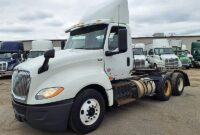U-Haul Car Trailer Rental Prices And Sizes: Your Comprehensive Guide to Vehicle Transportation cars.truckstrend.com
Moving a vehicle, whether it’s across town or across the country, can be a significant logistical challenge. For many, driving their car alongside a moving truck isn’t feasible or desirable. This is where U-Haul car trailer rentals come in, offering a practical and often cost-effective solution for transporting vehicles safely and efficiently. Understanding the various types, sizes, and pricing structures of U-Haul’s car trailers is paramount to making an informed decision that suits your specific needs and budget. This comprehensive guide will delve into every aspect of U-Haul car trailer rentals, ensuring you have all the information necessary for a smooth and successful vehicle move.
Why Choose a U-Haul Car Trailer for Your Vehicle Transportation Needs?
U-Haul Car Trailer Rental Prices And Sizes: Your Comprehensive Guide to Vehicle Transportation
U-Haul has long been a household name in the do-it-yourself moving industry, and their car trailer rentals are a testament to their commitment to providing diverse solutions. Opting for a U-Haul car trailer offers several distinct advantages:
- Cost-Effectiveness: For many, renting a trailer is significantly cheaper than hiring a professional auto transport service, especially for shorter distances or if you’re already renting a U-Haul truck for your household goods.
- Flexibility and Control: You dictate the schedule and route, offering unparalleled flexibility compared to relying on a third-party transporter.
- Wide Availability: With thousands of locations across North America, finding a U-Haul trailer for pick-up and drop-off is generally convenient.
- Reliable Equipment: U-Haul maintains a large fleet of well-maintained trailers designed for secure vehicle transport, providing peace of mind during your journey.
- Protection for Your Vehicle: Transporting your car on a trailer prevents mileage accumulation, wear and tear, and potential road hazards, preserving its condition.

U-Haul car trailers are ideal for a variety of scenarios, including cross-country moves, transporting non-drivable vehicles, moving classic cars, relocating for college, or simply ensuring your vehicle arrives safely without adding extra miles.
Understanding U-Haul Car Trailer Types and Sizes
U-Haul primarily offers two types of car trailers: the Auto Transport (often called a car carrier) and the Tow Dolly. Each is designed for different vehicle types and towing situations, making it crucial to select the right one for your needs.
1. U-Haul Auto Transport (Car Carrier)
The U-Haul Auto Transport is a robust, two-axle trailer designed to carry your entire vehicle with all four wheels off the ground.
- Description: This is the most secure and comprehensive option for vehicle transport. Your car is fully loaded onto a flat deck and secured with heavy-duty straps.
- Ideal For:
- Long-distance moves, especially cross-country.
- Transporting valuable, classic, or luxury vehicles where minimizing wear and tear is critical.
- Moving non-drivable vehicles (though you’ll need a winch or significant help to load).
- Vehicles with low ground clearance.
- Rear-wheel drive, all-wheel drive, or 4×4 vehicles.
- Key Features: Integrated ramps for easy loading, security chains, and ratchet-operated tire straps. It’s designed to provide a stable tow.
- Maximum Capacity: Typically accommodates vehicles up to 5,290 lbs. The towing vehicle must be significantly heavier (at least 750 lbs heavier than the towed vehicle + trailer) to ensure safe towing.
- Dimensions (Approximate):
- Max Vehicle Width: 79 inches
- Max Vehicle Wheelbase: 133 inches
- Deck Width: 79.25 inches (between fenders)
- Deck Length: 145 inches (usable deck)
- Overall Length: 210 inches (17.5 feet)
- Overall Width: 101.5 inches (8.5 feet)
2. U-Haul Tow Dolly
The U-Haul Tow Dolly is a single-axle trailer that lifts only the front two wheels of your vehicle off the ground, with the rear wheels remaining on the road.
- Description: A more compact and often more economical option, suitable for shorter distances or when the towed vehicle is front-wheel drive.
- Ideal For:
- Shorter distance moves (local or regional).
- Front-wheel drive vehicles (FWD).
- Saving on rental costs compared to the Auto Transport.
- Key Features: Includes a light bar, security chains, and tire straps. It’s lighter and easier to maneuver in some situations.
- Maximum Capacity: Accommodates vehicles up to 3,900 lbs. The towing vehicle must be at least 750 lbs heavier than the towed vehicle.
- Dimensions (Approximate):
- Max Vehicle Width: 76 inches
- Max Vehicle Wheelbase: 105 inches
- Deck Width: 76.5 inches (between fenders)
- Overall Length: 142 inches (11.8 feet)
- Overall Width: 101 inches (8.4 feet)
Important Note: Always verify your vehicle’s exact weight, width, and wheelbase against U-Haul’s specifications. U-Haul’s online reservation system will guide you and prevent you from renting a trailer that isn’t compatible with your vehicle or towing vehicle.
U-Haul Car Trailer Rental Prices: What to Expect
U-Haul car trailer rental prices are dynamic and influenced by several factors. Understanding these variables will help you accurately estimate your costs.
Key Pricing Factors:
- Distance and Duration:
- In-Town (Local) Rentals: These are typically daily rates, ideal for moving within the same city or short distances. Prices are generally lower.
- One-Way Rentals: For interstate or long-distance moves, U-Haul offers fixed rates that cover a specified number of days (e.g., 3-5 days). These rates are significantly higher than daily local rates but account for the convenience of dropping off at a different location.
- Trailer Type: The Tow Dolly is consistently less expensive than the Auto Transport due to its simpler design and lower capacity.
- Location and Demand: Prices can fluctuate based on the pick-up and drop-off locations, time of year (peak moving seasons like summer are more expensive), and local inventory availability.
- Add-ons and Accessories:
- SafeTow Coverage: U-Haul offers optional coverage for damage to the trailer or your towed vehicle. This is highly recommended for peace of mind.
- Hitches and Wiring: If your towing vehicle isn’t equipped, you might need to purchase or rent a hitch, ball mount, and wiring harness from U-Haul, adding to the cost.
- Moving Supplies: Straps, pads, and other items might be needed but are separate from the trailer rental.
General Price Ranges (Estimates Only):
It’s crucial to get an exact quote from U-Haul’s website or by calling them directly, as prices vary greatly. However, here are some approximate ranges to give you an idea:
- U-Haul Tow Dolly:
- Local (Daily): $40 – $60
- One-Way (Short Distance, e.g., 100-300 miles): $150 – $250
- One-Way (Long Distance, e.g., 1000+ miles): $250 – $500+
- U-Haul Auto Transport:
- Local (Daily): $50 – $80
- One-Way (Short Distance, e.g., 100-300 miles): $200 – $400
- One-Way (Long Distance, e.g., 1000+ miles): $400 – $800+
Note: These are estimates. Peak season, specific routes, and availability can push prices higher.
Practical Considerations for Renting a U-Haul Car Trailer
Renting a U-Haul car trailer involves more than just picking it up. Careful planning and adherence to safety guidelines are essential.
1. Towing Vehicle Requirements:
Your towing vehicle is critical for safe transport. U-Haul has strict requirements:
- Weight: The towing vehicle must be heavier than the vehicle being towed (plus the trailer’s empty weight). For Auto Transport, the tow vehicle must be at least 750 lbs heavier than the combined weight of the towed vehicle and the trailer. For a Tow Dolly, it must be at least 750 lbs heavier than the towed vehicle.
- Hitch: A properly installed hitch receiver (Class II, III, IV, or V) with the correct ball size (typically 1 7/8" or 2" for U-Haul trailers) is required.
- Wiring: Functional 4-way flat light connector for trailer lights.
- Brakes: While not always mandatory for smaller loads, a brake controller is highly recommended for heavier vehicle combinations for enhanced safety.
- Minimum Horsepower: Your vehicle needs sufficient power to safely pull the combined weight.
2. Loading and Unloading Your Vehicle:
- Level Ground: Always load/unload on a level, firm surface.
- Secure the Trailer: Engage the parking brake on the towing vehicle and ensure the trailer is securely coupled before loading.
- Ramps: Use the integrated ramps provided with the Auto Transport. For a Tow Dolly, position the vehicle carefully onto the ramps.
- Strapping: Secure your vehicle using the provided heavy-duty straps over the tires, ensuring they are tightened correctly. Also, use safety chains.
- Weight Distribution: Ensure the towed vehicle is centered on the trailer to maintain proper tongue weight and stability.
3. Safety Tips for Towing:
- Pre-Trip Inspection: Before departing, check tire pressure on both the towing vehicle and trailer, ensure all lights are working, and re-check all connections and straps.
- Drive Slower: Reduce your speed, especially on curves, turns, and downhills.
- Increased Braking Distance: Your stopping distance will be significantly longer with a trailer. Allow ample space between your vehicle and others.
- Wider Turns: Account for the increased length of your vehicle combination by making wider turns.
- Regular Checks: Stop periodically during your trip to check the straps, connections, and tire temperatures.
- Avoid Overloading: Never exceed the weight limits of the trailer or your towing vehicle.
4. Reservations:
Always make a reservation in advance, especially during peak moving seasons (late spring to early fall). This ensures availability and often locks in a price.
5. Insurance (SafeTow):
U-Haul offers "SafeTow" coverage, which can protect you from financial liability for damage to the trailer or your towed vehicle while it’s on the trailer. While optional, it’s a wise investment for peace of mind, as your personal auto insurance might not cover damage incurred while towing.
Complete Information: U-Haul Car Trailer Rental Prices And Sizes Table
Here’s a comprehensive table summarizing the key details for U-Haul’s car trailer rentals.
| Feature / Trailer Type | U-Haul Tow Dolly | U-Haul Auto Transport (Car Carrier) |
|---|---|---|
| Primary Use | FWD vehicles, short-to-medium distance, budget-friendly | All vehicle types, long-distance, higher value vehicles, non-drivable |
| Vehicle Wheels Off Ground | Front 2 wheels | All 4 wheels |
| Max Towed Vehicle Weight | Up to 3,900 lbs (1,769 kg) | Up to 5,290 lbs (2,400 kg) |
| Min Towing Vehicle Weight | 750 lbs heavier than towed vehicle | 750 lbs heavier than combined weight of towed vehicle + trailer |
| Max Towed Vehicle Width | 76 inches (193 cm) | 79 inches (200 cm) |
| Max Towed Vehicle Wheelbase | 105 inches (266 cm) | 133 inches (338 cm) |
| Trailer Empty Weight | Approx. 750 lbs (340 kg) | Approx. 2,210 lbs (1,002 kg) |
| Deck Width (Between Fenders) | 76.5 inches (194 cm) | 79.25 inches (201 cm) |
| Deck Length (Usable) | N/A (for wheels only) | 145 inches (368 cm) |
| Overall Length | 142 inches (11.8 ft / 360 cm) | 210 inches (17.5 ft / 533 cm) |
| Overall Width | 101 inches (8.4 ft / 256 cm) | 101.5 inches (8.5 ft / 258 cm) |
| Approx. Local Daily Rate | $40 – $60 | $50 – $80 |
| Approx. One-Way Rate (Short) | $150 – $250 | $200 – $400 |
| Approx. One-Way Rate (Long) | $250 – $500+ | $400 – $800+ |
| Required Ball Size | 1 7/8" or 2" | 2" |
| Required Electrical | 4-Way Flat | 4-Way Flat |
| Key Advantage | More affordable, lighter | Superior protection, handles all vehicle types |
Disclaimer: All prices listed are estimates and can vary significantly based on location, demand, season, and specific rental details. Always obtain a direct quote from U-Haul for accurate pricing.
Frequently Asked Questions (FAQ) about U-Haul Car Trailer Rentals
Q1: Can I rent a U-Haul car trailer without also renting a U-Haul truck?
A1: Yes, you can. However, your personal towing vehicle must meet U-Haul’s strict safety and weight requirements for towing the specific trailer and your vehicle. U-Haul’s system will verify this during the reservation process.
Q2: Do I need a special driver’s license to tow a U-Haul car trailer?
A2: For non-commercial use within the United States and Canada, a standard valid driver’s license is typically sufficient. You do not need a Commercial Driver’s License (CDL) to tow a U-Haul trailer for personal use.
Q3: What if my car is too wide or too heavy for the trailer?
A3: U-Haul’s reservation system is designed to prevent incompatible rentals. If your vehicle exceeds the maximum dimensions or weight for a specific trailer, the system will inform you and recommend an alternative or state that it cannot be towed. It’s crucial to provide accurate vehicle information.
Q4: Is insurance (SafeTow) mandatory, and what does it cover?
A4: SafeTow is optional but highly recommended. It typically covers accidental damage to the U-Haul trailer and damage to your personal vehicle while it is being towed on the U-Haul trailer. Your personal auto insurance policy might not cover these specific scenarios, so checking with your insurer is advised.
Q5: Can I pick up the trailer in one city and drop it off in another?
A5: Yes, this is the primary feature of "one-way" rentals. U-Haul allows you to pick up a trailer at one location and drop it off at any authorized U-Haul center across the country.
Q6: How do I load a non-drivable car onto an Auto Transport?
A6: Loading a non-drivable car can be challenging. While the Auto Transport has ramps, you will need a winch or significant manual assistance to pull the vehicle onto the trailer. U-Haul does not provide winches with their trailers. Consider professional assistance if you’re unsure.
Q7: What about low-clearance vehicles?
A7: The U-Haul Auto Transport is generally better for low-clearance vehicles as it offers a smoother ramp angle and a flat deck. However, extremely low-slung vehicles might still pose a challenge. Always exercise extreme caution during loading.
Conclusion
Renting a U-Haul car trailer offers a flexible, cost-effective, and empowering solution for transporting your vehicle. By carefully considering the two primary types – the Auto Transport and the Tow Dolly – and understanding their respective sizes, capacities, and pricing factors, you can make an informed decision that best suits your vehicle and your journey. Remember to prioritize safety by ensuring your towing vehicle meets all requirements, properly loading and securing your car, and driving with extra caution. With a little planning and adherence to U-Haul’s guidelines, your vehicle transportation experience can be as smooth and stress-free as your household move.



